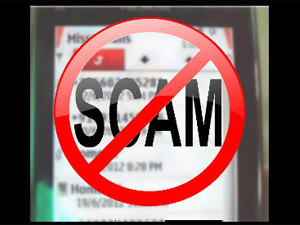
Cellphone users who receive hang-up calls from unfamiliar, seemingly international-in-origin, telephone numbers, may incur inflated costs - but are not in danger of having their contact lists or other sensitive information hacked.
This is contrary to information that has been circulating since about June - and recently resurfaced via cautionary SMS, social media and e-mail messages, warning about missed calls from numbers beginning with either 371 or 375.
The gist of the message is as follows: "People have been receiving calls from +375602605281, +37127913091 or any number starting with a +375, or +371. One ring and they hang up."
According to the widespread warning, as soon as you call back, you are likely to be charged between $15 to $30 (about R130 to R260) per minute. Furthermore, the alert claims, "they [the callers] can copy your contact list in three seconds. If you have bank or credit card details on your phone, they can copy that too."
The dialling code +375 is from Belarus, while +371 is the code for Latvia - both eastern European countries.
The message ends with a stern warning: "Do not answer or call back."
Details debunked
According to online urban legends reference pages Snopes.com, as well as local telecommunications services provider Nashua Mobile, the alerts are largely misleading - even false.
Similarly, Hoax-slayer.com, a myth-debunking site following Snopes.com's template, dismisses the warnings as having "elements of truth", but being "highly misleading and inaccurate".
Snopes.com says: "It's not possible that the mere act of calling a particular number would allow a phone user's contacts and banking information to be retrieved by someone else." That sort of information, explains the Snopes.com post, would only be compromised if another party hacked into the phone using a malicious app or code - so the user would essentially have to give permission by entering the code or downloading the app.
Bjorn Gebert, a sales executive at Nashua Mobile, says he sent the alert out to clients about two months ago, but purely to discourage customers from answering foreign calls or calling back strange numbers.
He says, while this kind of thing is doing the rounds, the consequences are petty. The worst that can happen to a "victim", says Gebert, is that they may be met with a heftier than usual cellphone bill at the end of the month - but banking credentials and other personal information cannot be hacked in this manner.
He says there are newer cellphone scams, such as an incident earlier this year, in which a Kempton Park resident's phone was breached by criminals who performed a SIM swap after she had turned her phone off due to incessant late-night calls. "The criminals gained access to her banking credentials after blocking access and performing a SIM swap. These are the types of scams that are doing the rounds lately," says Gebert.
According to Hoax-slayer.com's investigations, the purported $15 fee was actually much lower and, in short, the claim that simply returning the calls can result in personal data being instantly stolen from the user's phone is "nonsense".
Share